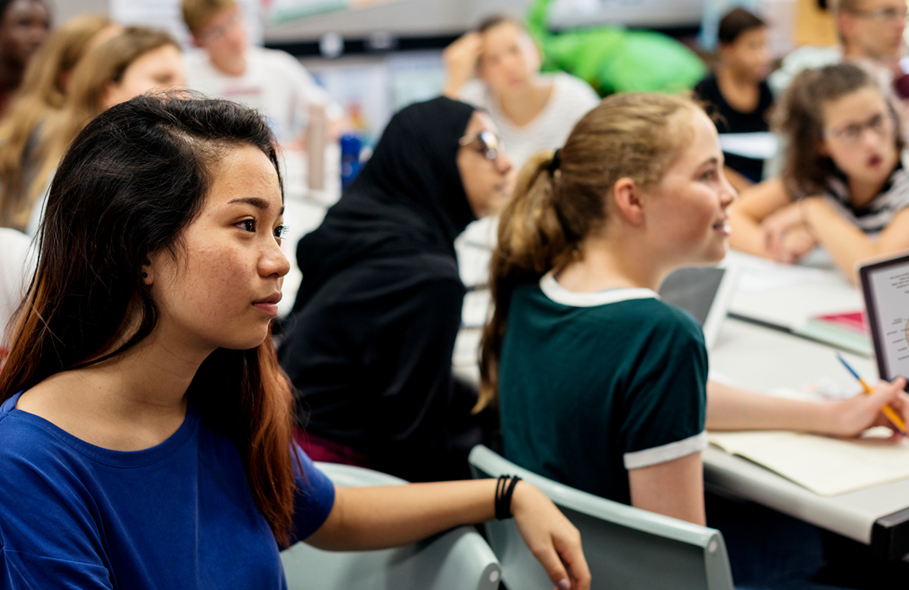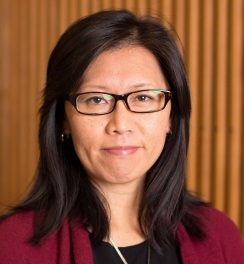Getting Ready to TEAACH
by Tom Hanlon / Feb 18, 2022

Elementary through high school teachers in Illinois are gearing up to teach about Asian American history, particularly in Illinois and the Midwest, and the College of Education is playing a key role in preparing those teachers.
Illinois is the first state in the nation to require its public schools to teach a unit on Asian American history, thanks to the Teaching of Equitable Asian American Community History (TEAACH) Act that was signed into law this past summer.
And the College of Education is doing its part in generating online professional development modules and recommending resources for educators from elementary through high school levels.
 Yoon Yoon Pak, professor and head in the Department of Education Policy, Organization & Leadership (EPOL), was part of an Illinois State Board of Education task force to develop resources for elementary through high school educators to teach students about Asian American history, with a special focus on their contributions and influence in Illinois and the Midwest. The instruction begins with the 2022-23 school year.
Yoon Yoon Pak, professor and head in the Department of Education Policy, Organization & Leadership (EPOL), was part of an Illinois State Board of Education task force to develop resources for elementary through high school educators to teach students about Asian American history, with a special focus on their contributions and influence in Illinois and the Midwest. The instruction begins with the 2022-23 school year.
College of Education Geared to Lead
“We’re looking to see what would be good entry-level resources for educators at all levels,” Pak says. “I believe the College of Education should take a lead in this, because we have the faculty who have been researching and teaching in this area for a long time.” Pak notes that she has been teaching a course on Asian American education for 20 years, and knew of no other universities with a formalized course on Asian American education when she first began teaching the course.
“With the doctoral students who helped develop this course over time, and the undergraduate students who have taken it, we now have a core group of people working together within the College and the campus,” she says. Besides herself, she names Sharon Lee, teaching assistant professor in EPOL; Sarah Park Dahlen, associate professor in the School of Information Sciences; Allison Witt, director of the Office of International Programs; Wei Liu, associate director of the Office of International Programs; and Asif Wilson, assistant professor from the Department of Curriculum & Instruction.
“They are a really wonderful group of people,” Pak says, with diversified qualifications and experiences to help the College take a leadership role in helping the state’s elementary through high school educators open the eyes of their students to the contributions Asian Americans have made to society.
Such education, she says, is needed.
Asian American History Deep in Illinois
“Sometimes we operate under the assumption that Asian Americans are newcomers in this area, but there’s a deep history in this region that we need to uncover,” Pak says. “This Act is an important recognition by the state to say here are the important ways that Asian Americans have played into the notions of race and racism. And now, with anti-Asian violence occurring across the nation and globally in the last few years, this really centers on the importance of the roles Asian American and Pacific Islanders have played in the formation of US society.”
The state is largely leaving curricula choices up to individual districts and schools.
“This is where I want the College of Education to take leadership,” Pak says. “To say, okay, you’ve been provided these general resources, which are a great start. Now, here’s a way the College can help you develop curricula that focuses on teaching in an equitable manner, which is part of the mandate.”
To that end, Pak says, the aforementioned core group is working to develop an online professional development micro credential geared to TEAACH.
So, she is working at both the state and campus levels to prepare teachers to instruct in accordance with the act.
College Positioned To Be Hub of Expertise
“I can see this as an important start for the College to be the go-to hub for professional development opportunities,” Pak says. “Especially where it relates to various race and ethnic studies areas. We have great specialists, educators, and scholars in this area. We’re recognized for this not only in the state, but, frankly, internationally. So, we can be that hub, and in addition to that, we can provide ongoing mentoring services for educators. It’s not just a one-and-done deal. We can provide a scaffold for continuous learning, improvement, and mentoring.”
But to be that sort of hub, she adds, takes campus-level support.
“If we are this serious about our land-grant mission, about public engagement where research is undertaken for on-the-ground educators, we need to have resources and support tied to these kinds of issues,” Pak says.